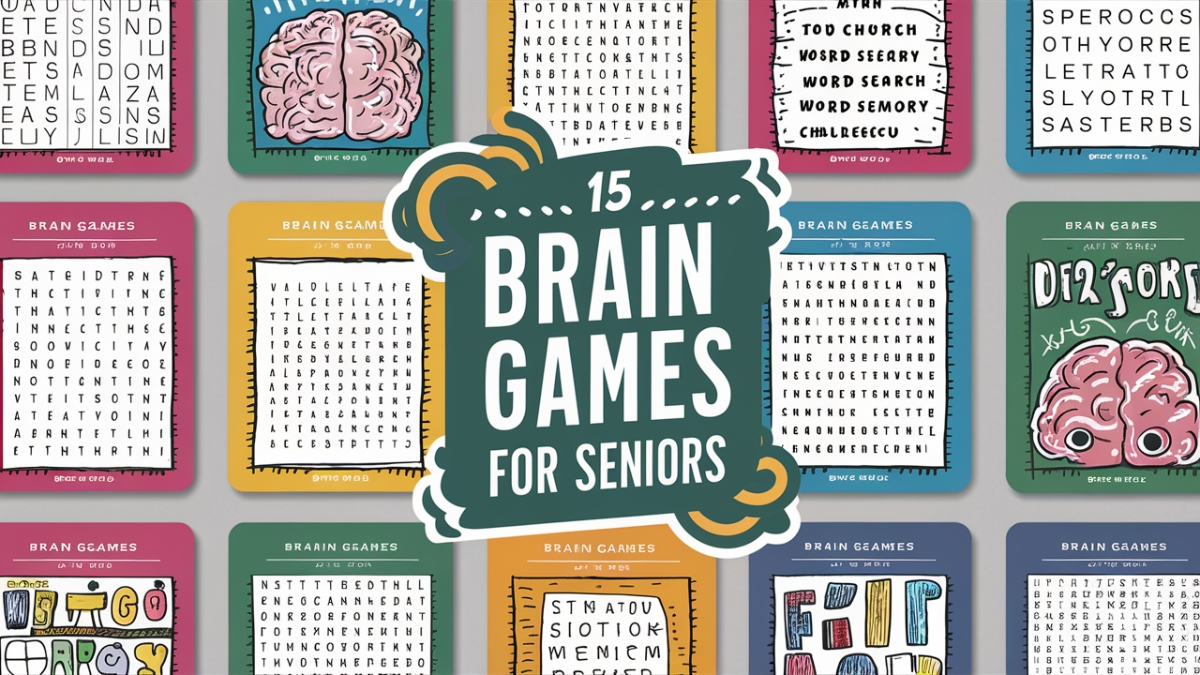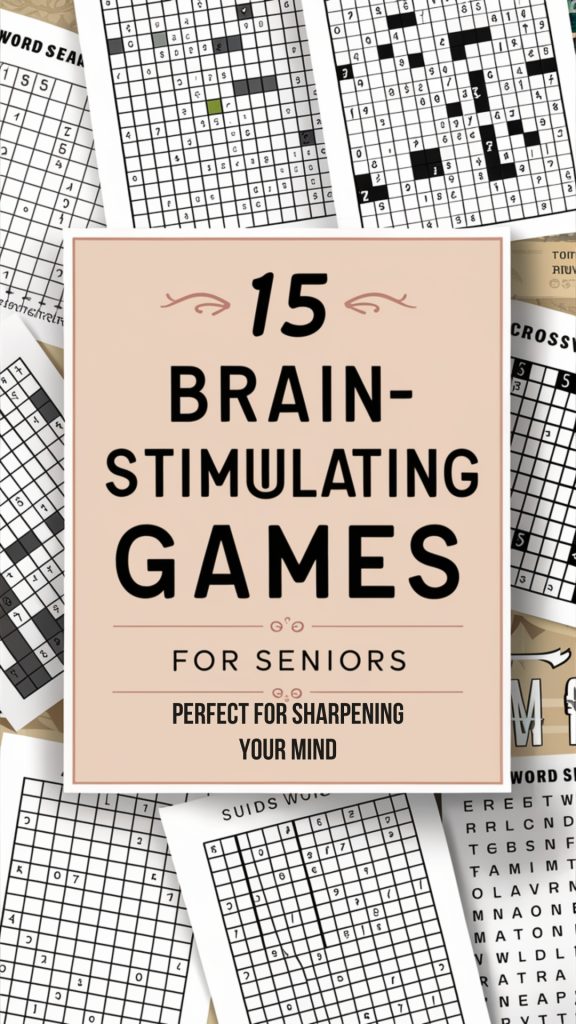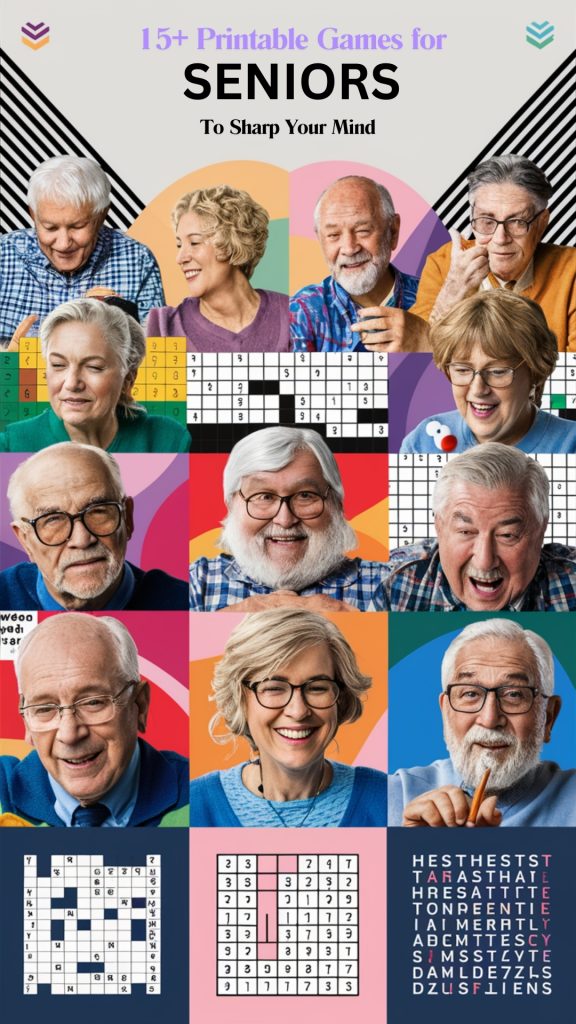19+ Brain Games for Seniors Printable for 2025

Engaging in brain games can help keep the mind active, improve cognitive function, and enhance memory.

In this article, I’ll present over fifteen brain games that are not only effective but also printable for easy access.
These activities range from crossword puzzles to Sudoku and beyond, providing a variety of options to suit different interests and skill levels.
Let’s begin!
Contents
- 1 1. Sudoku
- 2 2. Word Search
- 3 3. Maze Puzzles
- 4 4. Trivia Questions
- 5 5. Word Scramble
- 6 6. Cryptogram Puzzles
- 7 7. Rebus Puzzles
- 8 8. Crossword Puzzles
- 9 9. Hidden Object Games
- 10 10. Virtual Guess Who
- 11 11. Treasure Hunt
- 12 12. Memory Card Matching
- 13 13. Anagram Puzzles
- 14 14. Jigsaw Puzzles
- 15 15. Matchstick Puzzles
- 16 16. Kakuro Puzzles
- 17 17. Spot the Difference
- 18 18. Logic Grid Puzzles
- 19 19. Crossnumber Puzzles
- 20 20. Hexagonal Puzzles
1. Sudoku
Sudoku is a number puzzle game where you fill a 9×9 grid with numbers so that each column, row, and 3×3 section contain all digits from 1 to 9.
It helps improve logic and critical thinking skills. Sudoku puzzles range in difficulty, making them suitable for all skill levels.
These puzzles provide a great mental workout, keeping the mind sharp by requiring careful thought and strategy to complete each grid correctly.
2. Word Search
Word search puzzles involve finding specific words hidden within a grid of letters. The words can be placed horizontally, vertically, or diagonally.
These puzzles are great for enhancing vocabulary and mental agility. Themed word searches, such as those focused on animals or holidays, make the activity more engaging.
This game is simple yet effective in maintaining cognitive health by encouraging focus and attention to detail.
3. Maze Puzzles
Maze puzzles require finding a path from the start to the finish without hitting any dead ends. These puzzles help improve problem-solving skills and spatial awareness.
They come in various difficulty levels, suitable for both beginners and advanced solvers. Completing mazes can be a fun and rewarding way for seniors to stay mentally active and challenged.
4. Trivia Questions
Trivia games test knowledge on a variety of topics, such as history, music, and pop culture. These games are excellent for jogging the memory and sparking conversations.
Trivia questions can be played alone or in groups, making them versatile and social. LoveToKnow provides printable trivia questions from different decades, which can be particularly nostalgic and engaging for seniors.
This game helps maintain cognitive function by encouraging recall and critical thinking.
5. Word Scramble
In word scramble puzzles, letters of words are mixed up, and the challenge is to unscramble them to find the correct word. This game enhances vocabulary, spelling, and problem-solving skills.
Word scramble is an enjoyable way to keep the brain active, as it requires concentration and mental agility to rearrange the letters correctly.
6. Cryptogram Puzzles
Cryptograms involve decoding a hidden message where each letter of the alphabet is substituted with another letter. Solving cryptograms requires pattern recognition, grammar, and vocabulary skills.
These puzzles can be challenging but are rewarding as they stimulate critical thinking and analytical skills, making them a great brain exercise for seniors.
7. Rebus Puzzles
Rebus puzzles use pictures, symbols, and letters to represent words or phrases. Solving these puzzles requires interpreting the images and symbols to find the hidden message.
Rebus puzzles enhance problem-solving abilities and creativity. These puzzles are an enjoyable way to keep the mind engaged and challenged.
8. Crossword Puzzles
Crossword puzzles are word games where you fill in words based on clues given for each horizontal and vertical space in a grid. These puzzles improve vocabulary, general knowledge, and problem-solving skills.
Crossword puzzles are a classic brain game that can be played alone or with others, offering a satisfying mental challenge and a sense of accomplishment upon completion.
9. Hidden Object Games
Hidden object games involve finding items hidden within a detailed scene. These games can improve attention to detail and memory.
The player is given a list of items to find within a picture, and they must locate each item. This can be done on paper or online, with many websites offering printable versions.
These games are beneficial because they require the player to focus and scan the scene carefully, which can help improve visual perception and cognitive skills.
Hidden object games can be enjoyed alone or with friends, making them a versatile and engaging activity for seniors.

10. Virtual Guess Who
Virtual Guess Who is a fun game where you write down the name of an animal, character, or book title, and the other person guesses it using yes or no questions.
This game helps improve memory and deductive reasoning. It can be themed, adding an extra layer of context and fun.
For example, you can choose themes like movies, authors, or book titles. The aim is to guess the answer as quickly as possible.
This game can be played with family or friends, making it a great way to engage socially while stimulating the brain.
11. Treasure Hunt
A treasure hunt involves creating a list of activities or items to find around the house. This game encourages problem-solving and creativity.
You can set daily or weekly challenges, such as finding 20 items that start with a specific letter or writing an 80-word poem.
Treasure hunts can be simple or cryptic, with clues that lead to different locations or tasks. This game can be played alone or with others, making it a versatile and enjoyable activity for seniors.
12. Memory Card Matching
Players need to find pairs of matching cards from a shuffled deck placed face down. Each player flips over two cards per turn, trying to find a match.
If the cards match, the player keeps the pair and gets another turn. If not, the cards are flipped back over, and the next player takes a turn.
This game helps improve short-term memory and concentration. It can be played alone or with others, making it a fun and versatile activity.
13. Anagram Puzzles
Anagram puzzles involve rearranging letters to form new words or phrases. These puzzles help improve vocabulary and spelling skills.
Players are given a set of scrambled letters and must rearrange them to form meaningful words.
Anagram puzzles can be simple or complex, depending on the difficulty level. They can be played alone or with others, making them a flexible and engaging activity.
Printable anagram worksheets are available on educational websites, providing a wide range of topics and difficulty levels.
14. Jigsaw Puzzles
It involves piecing together a picture from small, irregularly shaped pieces. These puzzles help improve memory, visual-spatial reasoning, and problem-solving skills.
Players must fit the pieces together based on the picture on the box or an accompanying guide.
Jigsaw puzzles can vary in difficulty, from simple puzzles with large pieces to complex puzzles with thousands of pieces.
They can be completed alone or with others, making them a versatile activity. Printable jigsaw puzzles are available online, and you can also create your own.
15. Matchstick Puzzles
Matchstick puzzles involve arranging matchsticks to form specific shapes or solve problems. These puzzles help improve logical thinking and problem-solving skills.
Players are given a set of matchsticks and must move or rearrange them to create a specific shape or solve a given problem.
Matchstick puzzles can vary in difficulty, from simple shapes to complex arrangements. They can be played alone or with others, making them a versatile and engaging activity.
16. Kakuro Puzzles
Kakuro puzzles are number puzzles similar to Sudoku, but with an added element of arithmetic. Each puzzle consists of a grid with filled and empty cells.
The goal is to fill the empty cells with numbers that add up to the given sums, ensuring no number is repeated in any sum.
This game helps improve arithmetic skills and logical thinking. Printable Kakuro puzzles can be found on various puzzle websites.
17. Spot the Difference
In Spot the Difference puzzles, players are given two nearly identical images and must find a set number of differences between them.
This game enhances attention to detail and visual perception. It’s a simple yet engaging activity that can be done alone or with friends.
Many websites offer printable Spot the Difference puzzles, with themes ranging from simple objects to intricate scenes.
18. Logic Grid Puzzles
Logic grid puzzles involve reading a series of clues and filling out a grid to determine relationships between different elements.
Each puzzle includes a scenario and a set of clues, requiring players to use deductive reasoning to fill in the grid correctly. This game improves logical thinking and problem-solving skills.
19. Crossnumber Puzzles
Crossnumber puzzles are similar to crosswords but involve numbers instead of words. Players fill in the grid with numbers based on arithmetic clues.
This game helps improve math skills and logical reasoning. Printable crossnumber puzzles can be found on educational and puzzle websites.
20. Hexagonal Puzzles
Hexagonal puzzles use hexagon-shaped grids, where players fit pieces together to complete a picture or pattern.
This game enhances visual-spatial reasoning and problem-solving skills. Hexagonal puzzles are unique and add a different twist to traditional jigsaw puzzles

Fasial is the founder of the Fizzy Flare. He has been a passionate blogger since 2021. He ran three different websites in the past few years. Now he is focusing on Fizzy Flare to build an audience and help them organize their life.
